Ministry of Finance and the Public Service has announced Financial Services Commission (FSC} appointment of Langston Sibblies
From Peter Polack
Prominent Attorney Is New Board Member For The FSC – Jamaica Information Service (jis.gov.jm)
The invasion of Grenada by the United States military and a coalition of six Caribbean nations started on the morning of 25 October 1983 nearly forty years ago. Three decades later a trove of information was received from archivist and historian Ann Wilder who had an encyclopedic knowledge of the five tons of documents seized by the US Army during the invasion of Grenada that included the political detention of several hundred persons in Grenada after the revolution and the framework that supported this dark period of Caribbean history. Had these events taken place after the 2002 Rome statute that created the International Criminal Court it is likely that many of the participants would have joined the likes of Charles Taylor to face charges of crimes against humanity. The research into the unlawful detention and torture of hundreds of detainees after the Grenada revolution was not to focus on ideology but to place truth before reconciliation. The Grenada revolution came about on 13 March 1979 when the Maurice Bishop, the leader of the New Jewel Movement, overthrew the elected government of the tyrant Eric Gairy while he was off the island. Several members of the movement were subsequently incarcerated after the revolution, prominent among them, former Attorney-General Lloyd Noel. Maurice Bishop confirmed in a 5 June 1983 report by Bernard Nossiter of The New York Times that his government had jailed up to forty people without charge or trial. He went on to explain the lack of charges by stating that the preferment of charges required the collection, preparation and organization of evidence when there was a shortage of prosecutors. Bishop accused Noel of being corrupt while Lloyd’s friends stated his detention came about after Noel had urged free elections, freedom of the press and civil rights. At the time of Bishop’s response it was likely that several hundred persons had been detained. In the Nossiter report, Amnesty International had stated that there were 110 detainees. The undated memorandum from Miles Fitzpatrick to Bishop believed to be about April 1981 puts the number of detainees at over 200 in Richmond Hill prison alone. The detainee figure put forward was a clear lie by Bishop to the international press.
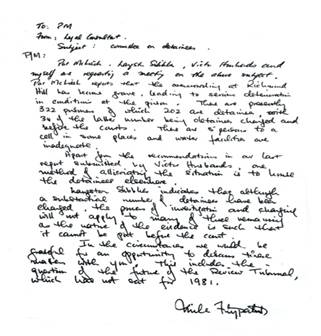
An undated, hand-written memo from Miles Fitzpatrick to PM Bishop is approximated to have been written after 2 April 1981:
To: PM
From: Loyal Consultant
Subject: Committee on Detainees
P/M:
Pat McLeish, Langston Sibblies, Victor Husbands and myself are requesting a meeting on the above subject. Pat McLeish reports that the overcrowding at Richmond Hill has become grave, leading to serious deterioration in conditions at the prison. There are presently 322 prisoners of which 202 are detainees, with 34 of the latter number being detainees charged and before the courts. There are 5 persons to a cell in some places and water facilities are inadequate. Apart from the recommendation in our last report submitted by Victor Husbands, one method of alleviating the situation is to house the detainees elsewhere.
Langston Sibblies indicates that although a substantial number of detainees have been charged, the process of investigation and charging will not apply to many of these remaining as the nature of the evidence is such that it cannot be put before the court.
In the circumstances we would be grateful for an opportunity to discuss these matters with you.
This includes the question of the future of the Review Tribunal, which has not sat for 1981.
Miles Fitzpatrick
The memorandum confirmed the serious deterioration in conditions at Richmond Hill prison, grave overcrowding with five persons to a cell in some places and inadequate water facilities.
That document noted the most important fact: “Langston Sibblies indicates that although a substantial number of detainees have been charged, the process of investigation and charging will not apply to many of these remaining as the nature of the evidence is such that it cannot be put before the court”. An overt admission of unlawful detention in breach of the local constitution, laws and international conventions. In the fullness, past, present and future combat captives were treated in a more humane manner, worldwide.
If this document is accurate, Sibblies was acting in some capacity within the People’s Revolutionary Government of Grenada in regard to detainees prior to his formal appointment as Director of Public Prosecutions on 15 May 1981.
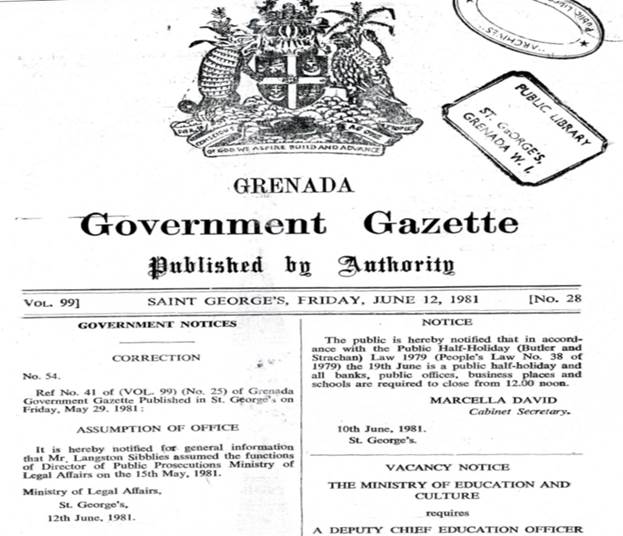

Sibblies stated in November 2013 that he had no comment when this incriminating document was revealed to him. Ironically, the Cayman Islands where Sibblies, a former chairman of the Law Reform Commission now resides, recently amended its laws to allow an adverse inference to be drawn when an accused person chooses to remain silent.
Of the over 200 detainees only 34 were before the court.
The detainee infrastructure consisted of Bishop as the head followed by Sibblies as DPP , Miles Fitzpatrick as legal consultant, Police Commissioner Pat McLeish and Victor Husbands.
This was confirmed by a memorandum dated 26 January 1982 from DPP Sibblies to Bishop that provided a status report on a few detainees. Sibblies was also a member of the Detainee Task Force with three others as revealed in a 29 September 1981 report to Prime Minister Bishop on attempts to reduce the detainee population for several reasons:
- Overpopulation of the prison and detention facilities
- High cost of maintenance of the detainees
- The availability of restriction orders to allow release of detainees while limiting their freedom of movement
- Detainees ceasing to be a threat to security of the state, public safety and order
The most interesting part of this document comes at the end when Sibblies, the most senior member of the group, and the other task force members approve the continued detention of Stephen Cuffie, a citizen of St. Vincent detained from 18 December 1979 because he had complained of torture and ill-treatment at Fort Rupert, where Maurice Bishop was later killed. It was decided to continue the unlawful, unjust and heinous imprisonment of Cuffie in the interests of unfavourable propaganda, an imaginary charge probably only comparable then in the Soviet or Cuban regime.
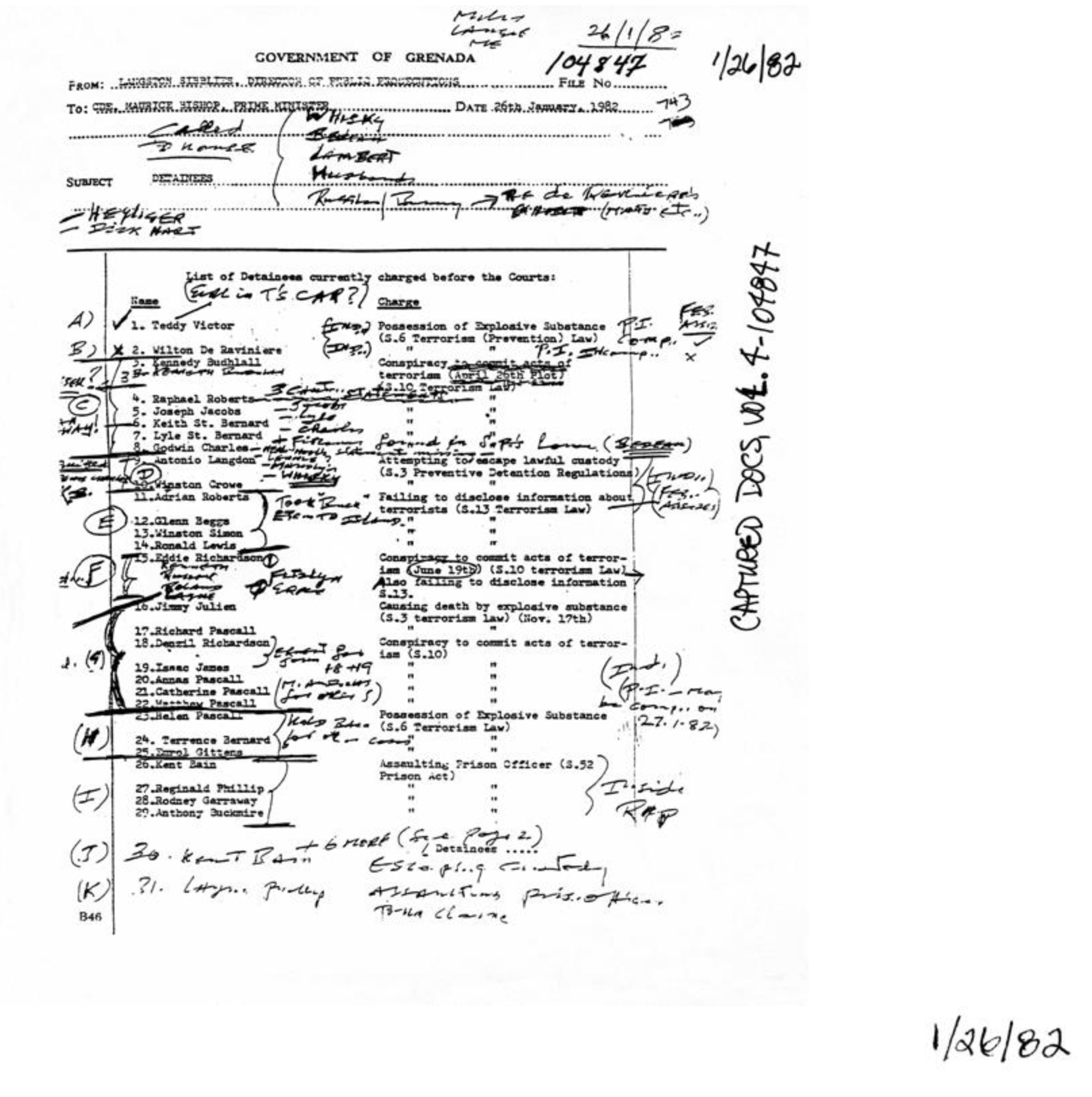

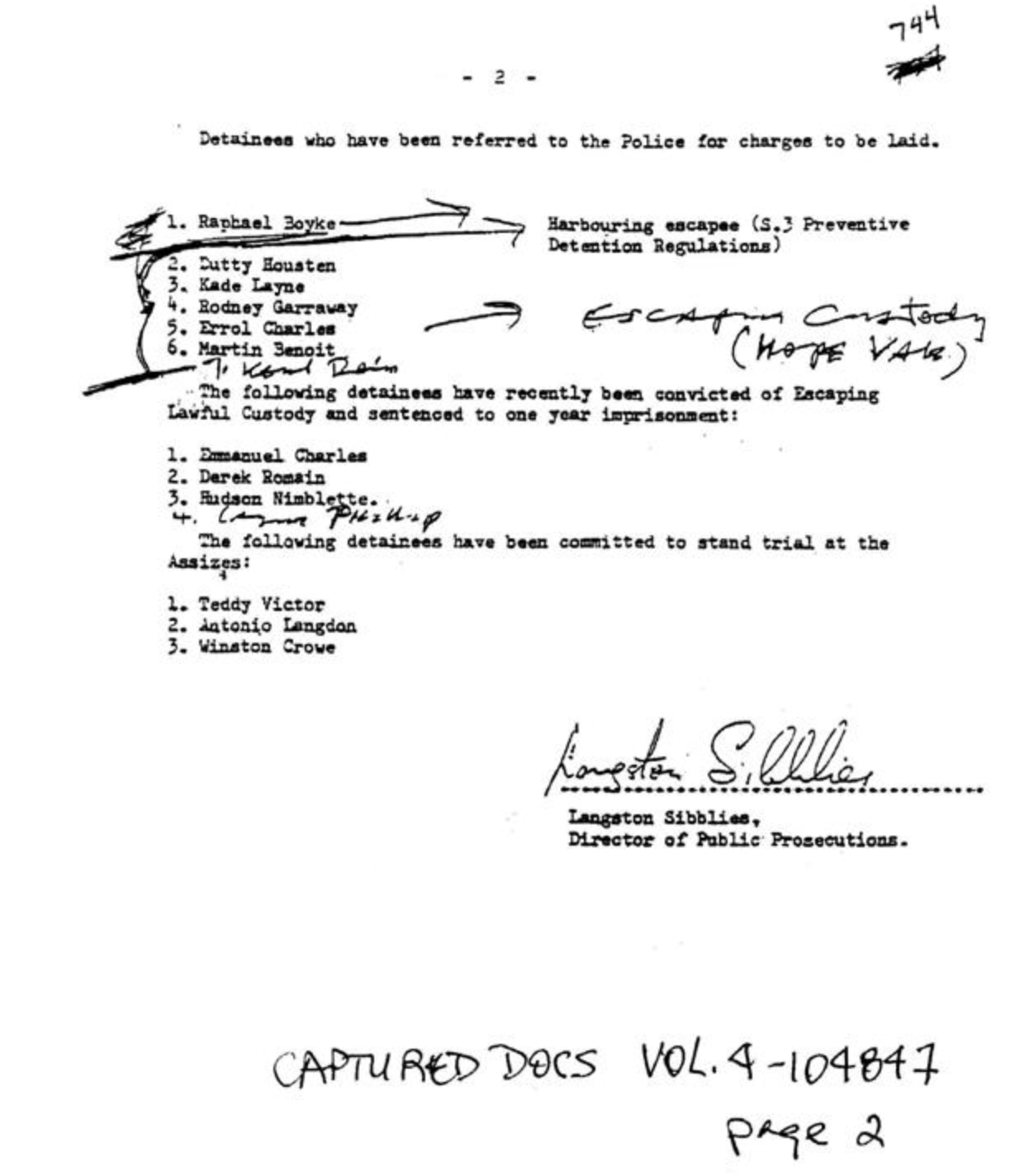

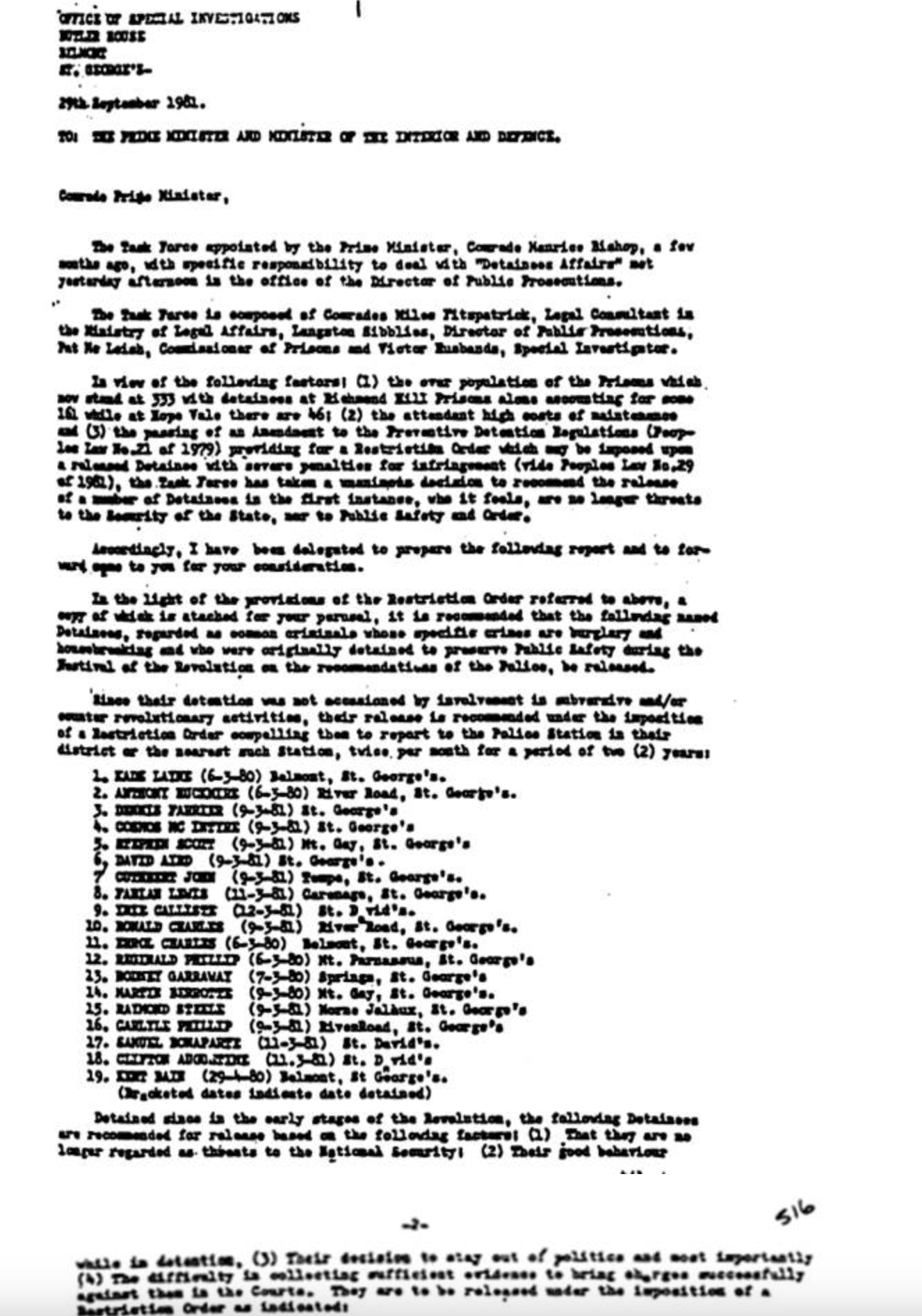

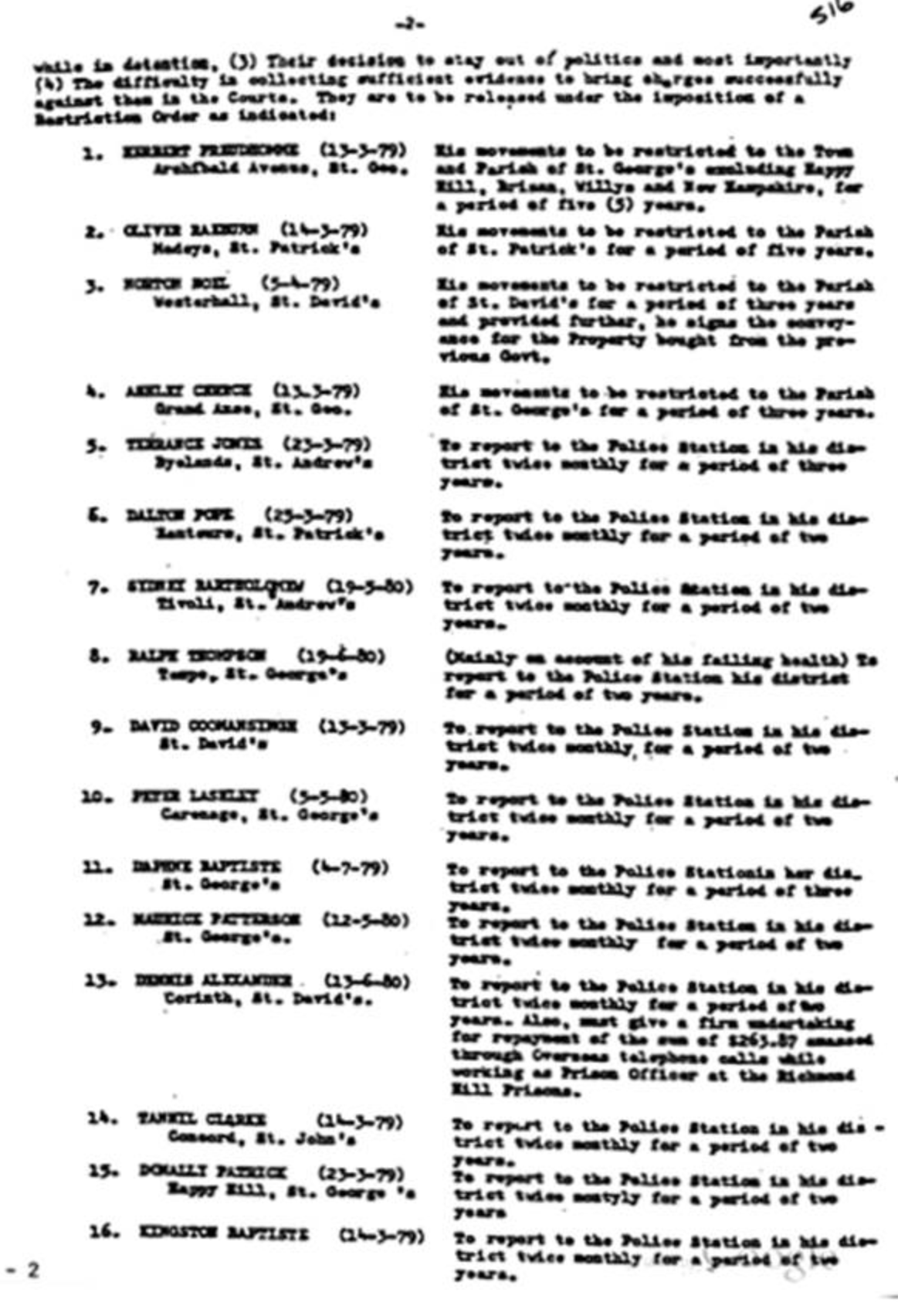

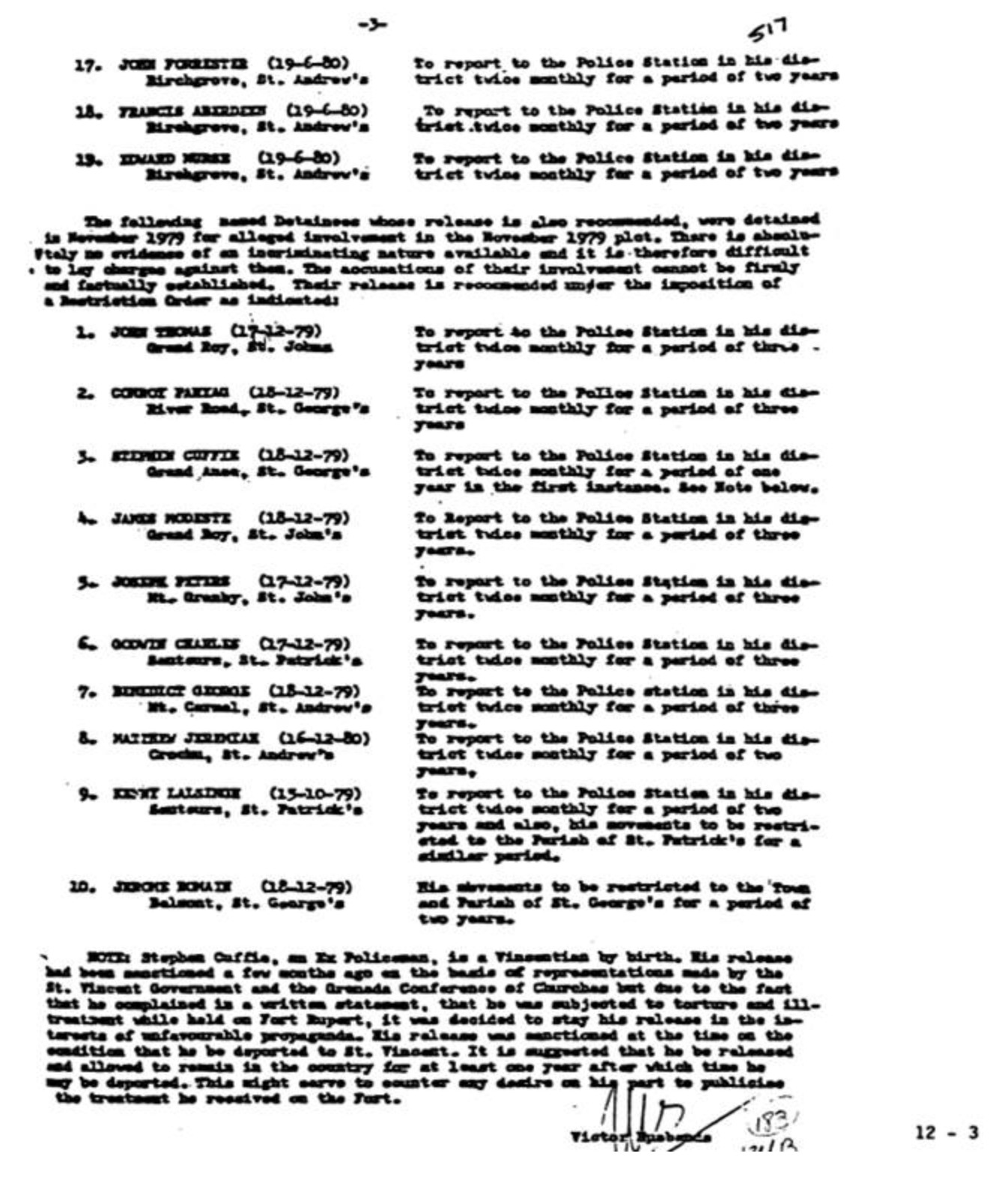


Langston Sibblies left the Cayman Islands Monetary Authority in 2019 having been appointed Queen’s Counsel on the recommendation of then Chief Justice Anthony Smellie in 2009. He was appointed to the Cayman Islands Judicial and Legal Services Commission, a body which appoints judges, in 2017. In 2021 he was appointed to the Financial Services Commission of Jamaica.
Notes
1. Bernard Nossiter, GRENADA’S LEADER CONCEDES JAILING UP TO 40 FOES, The New York Times, 5 June 1983
2.Grenada Documents Microfiche DSI-83-C-007139, Record Group [RG] 373.2, National Archives II, College Park, MD [NACP], Memo from Miles Fitzpatrick to PM, [April 1981]
3.Cayman Islands Police Law 2010, s.149
4.Michael Ledeen and Herbert Romerstein, Grenada Documents: An Overview and Selection, U.S. Government Printing Office
5. Caribbean News Briefs, UPI Archives, 5 October 1984
6. Governor appoints QCs, Cayman Islands Law Reform Commission press release,25 November 2009
7.Cayman Islands Judicial and Legal Services Commission website, About Us, Commission Members
8.Lisa Rowe, Jamaica Information Service press release, 7 September 2021
Biography
Peter Polack was a former criminal lawyer in the Cayman Islands for several decades. He is the author of The Last Hot Battle of the Cold War: South Africa vs. Cuba in the Angolan Civil War (2013), Jamaica, The Land of Film (2017) and Guerrilla Warfare: Kings of Revolution (2018). He was a contributor to Encyclopedia of Warfare (2013) and worked as a part-time reporter for Reuters News Agency in the Cayman Islands 2014-19 but now lives in Canada. His work has been published in Small Wars Journal, Defence Procurement International, American Intelligence Journal, U.S. Army John F. Kennedy Special Warfare Center magazine, Military Times, Foreign Policy News, EU Today, Radio Free Europe, VOA Portuguese, South Africa Times, History Cooperative, INews Cayman, Jamaica Gleaner, Miami Herald, Reuters, Toronto Star and The New York Times. His latest book entitled Soviet Spies Worldwide: Country by Country, 1940–1988 will be published by McFarland. He is presently researching his next book The Grenada Gulag.








2 COMMENTS